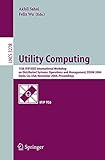Utility Computing [electronic resource] : 15th IFIP/IEEE International Workshop on Distributed Systems: Operations and Management, DSOM 2004, Davis, CA, USA, November 15-17, 2004. Proceedings / edited by Akhil Sahai, Felix Wu.
Material type: TextSeries: Lecture Notes in Computer Science ; 3278Publisher: Berlin, Heidelberg : Springer Berlin Heidelberg, 2004Description: XII, 276 p. online resourceContent type: text Media type: computer Carrier type: online resourceISBN: 9783540301844Subject(s): Computer science | Computer Communication Networks | Operating systems (Computers) | Information Systems | Computer Science | Computer Communication Networks | Programming Techniques | Operating Systems | Management of Computing and Information Systems | Computers and SocietyAdditional physical formats: Printed edition:: No titleDDC classification: 004.6 LOC classification: TK5105.5-5105.9Online resources: Click here to access online
TextSeries: Lecture Notes in Computer Science ; 3278Publisher: Berlin, Heidelberg : Springer Berlin Heidelberg, 2004Description: XII, 276 p. online resourceContent type: text Media type: computer Carrier type: online resourceISBN: 9783540301844Subject(s): Computer science | Computer Communication Networks | Operating systems (Computers) | Information Systems | Computer Science | Computer Communication Networks | Programming Techniques | Operating Systems | Management of Computing and Information Systems | Computers and SocietyAdditional physical formats: Printed edition:: No titleDDC classification: 004.6 LOC classification: TK5105.5-5105.9Online resources: Click here to access online  E-BOOKS
E-BOOKS
| Current library | Home library | Call number | Materials specified | URL | Status | Date due | Barcode |
|---|---|---|---|---|---|---|---|
| IMSc Library | IMSc Library | Link to resource | Available | EBK3379 |
Management Architecture -- Requirements on Quality Specification Posed by Service Orientation -- Automating the Provisioning of Application Services with the BPEL4WS Workflow Language -- HiFi+: A Monitoring Virtual Machine for Autonomic Distributed Management -- SLA Based Management -- Defining Reusable Business-Level QoS Policies for DiffServ -- Policy Driven Business Performance Management -- Business Driven Prioritization of Service Incidents -- Policy Based Management -- A Case-Based Reasoning Approach for Automated Management in Policy-Based Networks -- An Analysis Method for the Improvement of Reliability and Performance in Policy-Based Management Systems -- Policy-Based Resource Assignment in Utility Computing Environments -- Automated Management -- Failure Recovery in Distributed Environments with Advance Reservation Management Systems -- Autonomous Management of Clustered Server Systems Using JINI -- Event-Driven Management Automation in the ALBM Cluster System -- Analysis and Reasoning -- A Formal Validation Model for the Netconf Protocol -- Using Object-Oriented Constraint Satisfaction for Automated Configuration Generation -- Problem Determination Using Dependency Graphs and Run-Time Behavior Models -- Trust and Security -- Role-Based Access Control for XML Enabled Management Gateways -- Spotting Intrusion Scenarios from Firewall Logs Through a Case-Based Reasoning Approach -- A Reputation Management and Selection Advisor Schemes for Peer-to-Peer Systems -- Implementation, Instrumentation, Experience -- Using Process Restarts to Improve Dynamic Provisioning -- Server Support Approach to Zero Configuration In-Home Networking -- Rule-Based CIM Query Facility for Dependency Resolution -- Short Papers -- Work in Progress: Availability-Aware Self-Configuration in Autonomic Systems -- ABHA: A Framework for Autonomic Job Recovery -- Can ISPs and Overlay Networks Form a Synergistic Co-existence? -- Simplifying Correlation Rule Creation for Effective Systems Monitoring.
This volume of the Lecture Notes in Computer Science series contains all the papersacceptedforpresentationatthe13thIFIP/IEEEInternationalWorkshop on Distributed Systems: Operations and Management (DSOM 2004), which was held at the University of California, Davis during November 15–17, 2004. DSOM2004wasthe?fteenthworkshopinaseriesofannualworkshopsandit followed in the footsteps of highly successful previous meetings, the most recent of which were held in Heidelberg, Germany (DSOM 2003), Montreal, Canada (DSOM 2002), Nancy, France (DSOM 2001), and Austin, USA (DSOM 2000). The goal of the DSOM workshops is to bring together researchers in the areas of networks, systems, and services management, from both industry and academia, to discuss recent advances and foster future growth in this ?eld. In contrast to the larger management symposia, such as IM (Integrated Management) and NOMS (Network Operations and Management Symposium), the DSOM wo- shops are organized as single-track programs in order to stimulate interaction among participants. The focus of DSOM 2004 was “Management Issues in Utility Computing. ” Increasingly there is a trend now towards managing large infrastructures and services within utility models where resources can be obtained on demand. Such a trend is being driven by the desire to consolidate infrastructures within - terprises and across enterprises using third-party infrastructure providers and networked infrastructures like Grid and PlanetLab. The intent in these init- tives is to create systems that provide automated provisioning, con?guration, and lifecycle management of a wide variety of infrastructure resources and s- vices, on demand.


There are no comments on this title.